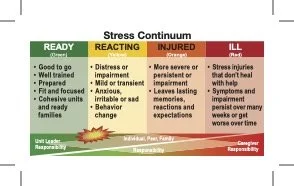Operational Stress First Aid
Supporting Radio Responders Who Carry the Weight of Others’ Stress
Radio responders serve a critical role in emergency response systems. Much like 911 operators, they are the first point of contact when someone calls for help. Although they may not be physically present at the scene, their voices guide, reassure, and coordinate crucial assistance for people in distress. This responsibility often means that radio responders absorb significant emotional and psychological stress—not just from the emergencies they manage but from the accumulated burden of countless callers’ fears and anxieties.
Understanding Operational Stress First Aid
Operational Stress First Aid (OSFA) is a practical, evidence-informed approach designed to offer immediate support to those experiencing stress in high-pressure environments. Originally developed for military personnel, OSFA emphasizes recognizing early signs of stress, providing basic Spiritual and psychological first aid, and fostering resilience before issues escalate into more serious mental health problems.
For radio responders, OSFA can be an invaluable tool. It equips them with skills not only to care for themselves but also to support fellow team members who are similarly exposed to cumulative stress.
Why Radio Responders Need Operational Stress First Aid
Chronic Exposure to Emotional Strain: Unlike emergency responders who attend to a single incident before moving on, radio responders continuously handle multiple distress calls, often involving trauma, loss, and urgent crises. This ongoing exposure can lead to emotional exhaustion or compassion fatigue.
Extended Shifts During Emergencies: In natural disasters or other large-scale activations, radio responders frequently endure long working hours with few breaks. Fatigue combined with the emotional load can reduce focus, decision-making ability, and overall well-being.
Limited Physical Outlet for Stress: Since radio responders are not on the front lines, they may have fewer opportunities to physically decompress after stressful interactions. The lack of separation from the emotional content can compound stress effects.
How OSFA Supports Radio Responders
Early Recognition of Stress Symptoms: OSFA teaches radio responders to identify signs of stress in themselves and their peers—such as irritability, difficulty concentrating, or withdrawal—so that timely support can be offered.
Peer-to-Peer Support: Creating an environment of trust encourages team members to check in on one another, share coping strategies, and reduce feelings of isolation.
Stress Management Techniques: OSFA promotes simple, practical interventions such as controlled breathing, grounding exercises, and taking micro-breaks, which can be integrated even during busy shifts.
Facilitates Access to Professional Help: When stress symptoms persist or worsen, OSFA guides responders to appropriate mental health resources, ensuring early intervention and recovery.
Radio responders play a vital yet often overlooked role in emergency response systems. The emotional toll of carrying the weight of others’ crises can be significant, especially during prolonged emergency activations. Operational Stress First Aid offers radio responders practical tools to recognize stress early, support themselves and each other, and maintain mental resilience. Implementing OSFA principles can improve not only the well-being of these frontline communicators but also the quality of care they provide to those in need.
Promoting mental and Spiritual health awareness and support within radio response teams ensures that these essential workers remain strong pillars of our emergency response community.




